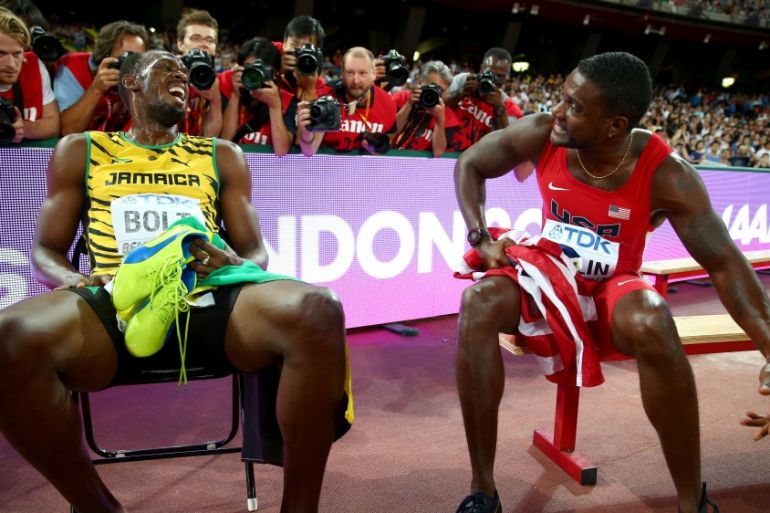Unsporting behaviour, the darker side of the Olympics
When athletes try everything from head-butts to kicking to edge out an opponent, the spirit of the Games is questioned.

Rio de Janeiro, Brazil – In 1889, French aristocrat and historian Baron Pierre de Coubertin laid down his plans for reviving and re-instigating the Olympic Games, an event that had long faded into antiquity.
His plans were in line with his own philosophical ideals that competition itself and the very struggle to overcome one’s opponent was more important than winning.
Keep reading
list of 4 itemsWADA to launch independent review into Chinese swimmers’ doping case
What to know about Chinese Olympic swimmers’ doping scandal
Paris 2024 torch lit in Olympics birthplace, relay under way
“The important thing is not to win, but to take part,” de Coubertin famously declared.

De Coubertin’s dream of a modern Olympic Games was realised seven years later with the Athens Olympics of 1896. But 120 years later, the spirit that he so passionately promoted is often forgotten in the hunt for medals, fame and glory.
At the 1936 Berlin Olympics, German long jumper Luz Long gave crucial advice to great rival Jesse Owens to help him qualify for the final. Episodes like that have gone down well, but the history of the Games is littered with incidents of unsporting behaviour in the heat of combat.
Fans are used to displays of gamesmanship in tennis, football, and athletics, the darker spirit of the Olympics is also very much in evidence across the Games.
At Beijing 2008, Chilean tennis player Fernando Gonzalez caused outrage when he refused to own up to a shot clipping his racket at a crucial stage in his semi-final with James Blake.
Gonzalez claimed the point and went on to win a silver medal.
In athletics, pre-race intimidation tactics have long played a crucial role in the testosterone-fuelled sprint races. Justin Gatlin was once seen apparently spitting into Usain Bolt’s lane before a 100m showdown.
Rio 2016 is the first Olympics since Los Angeles 1984 where male boxers have stepped into the ring without protective headgear, a change made by the International Boxing Association to reduce the risk of concussions.
![It is the first time since Los Angeles 1984 that male boxers are without protective headgear [Getty Images]](/wp-content/uploads/2016/08/94163179f70444e7a8ea58f053d45f48_18.jpeg)
But some fighters are exploiting the rules, knowing that their opponents are more vulnerable to cuts from a clash of heads which could see them forced out of the fight.
“Some fighters will intentionally try to head-butt and cut you to get the win,” US light-flyweight Nico Hernandez told Al Jazeera after reaching the semi-finals.
“I’ve been working on trying to stay out of trouble, but boxing’s not a clean sport. People will try deliberately. I’ve been head-butted on purpose.”
On Tuesday, a clash between Russia’s Adlan Abdurashidov and Algeria’s Reda Benbaziz saw the latter furious after he sustained a deep cut above his right eye from a clash of heads.
“He [Abdurashidov] was using his head a lot, which isn’t allowed,” Benbaziz fumed when speaking to Al Jazeera.
Rio 2016: Cuban boxers look to dominate in the ring
The Russian defended his tactics, saying he had no choice as Benbaziz had longer arms.
Gamesmanship has long been a part of team sports with cynical fouls, verbal abuse along with shoves, elbow digs, head-butts and even groping when the officials are not looking.
In water polo, such tactics are common, especially with the knowledge that the referee cannot see everything happening under water.
“Literally, everything you can possibly imagine happens to try and get an edge,” Greek water polo player Kyriakos Pontikeas, part of the bronze-winning team at last year’s World Championships, said.
“Pulling the other guy’s swimsuit and grabbing their legs or arms happens all the time in addition to hard kicks under the water, or even above the water if the referee’s looking the other way.
“You can either get him straight away or bide your time and wait for another critical moment and give him exactly the same.”
![Pulling swimsuits or grabbing the opponent's arms or legs is a common tactic in water polo [Getty Images]](/wp-content/uploads/2016/08/6ea8cee0621141c3a4c620eac52219b6_18.jpeg)
Swimmers compete in separate lanes so the sport may appear to be immune from such displays apart from attempts to psyche out key rivals in the call-room minutes before the race.
However, that isn’t the case in marathon swimming, which takes place over a 10km open-water course. With no lanes, athletes are bunched together in a large, thrashing pack and in a desperate fight for space and position.
As the race heats up, it is no-holds barred.
“It’s getting more and more physical as the sport’s still very young and people are still learning new things,” New Zealand competitor Kane Radford said.
“There’s so much going on under the water. You’ve got guys who used to just touch people’s feet to annoy them. Now they’re slightly grabbing them and then letting go so that it kind of stops your momentum but not enough so that the officials can see it.
“There is also the hitting under the water and the elbows into the ribs every now and then. You’ll be swimming next to someone and, accidentally or on purpose, they’ll hit you in the head during their arm stroke.”
Rio 2016: Olympians get creative combating Zika
Radford explains that you can either try to give back as good as you got, or simply stay out of trouble.
“When it comes to the Olympics, you know who the rough swimmers are, so you can position yourself in the pack away from those guys or try to swim at the front of the pack.”
While such tactics are an accepted part of open-water swimming, in the fencing community, gamesmanship is treated with outrage as the essence of the sport centres around honour and mutual respect for the opponent.
At a tournament last year, former Olympic bronze medallist Aleksey Yakimenko intentionally dropped his sabre at 14-14 in the race-to-15-points contest to prevent his opponent, France’s Nicolas Rousset, from launching a potentially decisive attack.
The point was replayed and Yakimenko won 15-14.
De Coubertin would undoubtedly be outraged at the sight of this.
But many athletes say that gamesmanship is so entrenched into sport due to the potential rewards at stake, you simply have to accept it.
“It’s all connected. You just need to stay relaxed because they’re doing it to try and get you wound up and use your energy,” Radford said.
“It just adds another aspect to our events which you have to think about.”
|
|